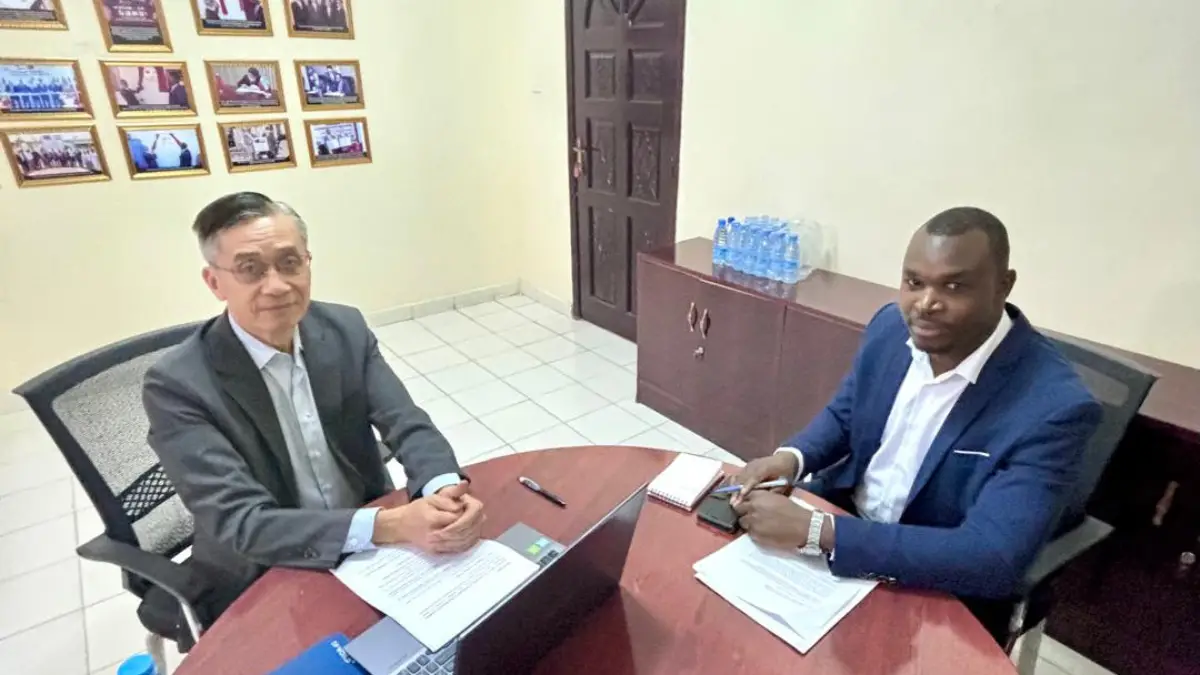Editorial Note: This article is the second article in a two-part series from guest contributor Richard Atimniraye Nyelade. Read the first article here.
In a modest yet symbolically charged room at the Taiwan Representative Office in Hargeisa, Somaliland, I sat down with Ambassador Allen Lou, Taiwan’s representative to Somaliland, to discuss Taiwan’s nuanced diplomatic efforts across Africa. Accompanied by Chris Lee, First Secretary at the office, Ambassador Lou outlined Taiwan’s long-standing pursuit of international recognition through selective partnerships in the Global South. The room’s decor, adorned with photographs capturing Taiwan’s strategic engagements, subtly narrated the nation’s efforts to assert its identity and relevance in a global order where statehood, sovereignty, and recognition are constantly contested.
Drawing on contemporary theories in political sociology and international relations, Taiwan’s diplomacy in Somaliland serves as a compelling case study for exploring how small or marginalized states navigate the complex terrain of global politics. Taiwan’s strategy reflects the dynamic interplay of power, status, and sovereignty, revealing new dimensions of soft power diplomacy and the pursuit of legitimacy in the face of geopolitical adversity.
Theoretical Context: Sovereignty and the International Society
To comprehend Taiwan’s diplomatic strategy in Somaliland, it is crucial to frame it within Barry Buzan’s English School theory of international relations, which conceptualizes the international society as a construct where states—both recognized and unrecognized—engage in a shared social space. According to Buzan, the international society is defined by common institutions, rules, and norms that determine which states are granted legitimacy and which remain in the peripheries (Buzan, 2004). Taiwan, as a de facto independent state without de jure recognition, operates on the margins of this society, but its diplomatic endeavors, particularly in contested regions like Somaliland, challenge the conventional order and highlight the complexities of statehood.
Somaliland’s quest for international recognition mirrors Taiwan’s struggle, making it an ideal site for testing the concepts of subaltern realism and liminal sovereignty. Mohammed Ayoob (1995) argues that subaltern states—those marginalized or excluded from the dominant international order—tend to adopt unconventional foreign policy behaviors that disrupt established power dynamics. Taiwan’s use of soft power, developmental aid, and diplomatic engagement exemplifies these strategies, allowing it to assert its identity in regions where its presence is both welcomed and politically significant.
The theoretical notion of liminal sovereignty also applies to Somaliland, whose ambiguous political status parallels Taiwan’s own. In this context, Taiwan and Somaliland operate as liminal actors—entities that occupy the threshold between formal recognition and non-recognition (Loh & Heiskanen, 2020). Both actors navigate a complex web of international norms and expectations, negotiating their sovereignty in ways that redefine traditional understandings of statehood and legitimacy.
Somaliland as a Liminal Space for Diplomatic Experimentation
Ambassador Lou’s remarks highlighted the importance of strategic engagement in Somaliland as part of Taiwan’s broader vision for the Horn of Africa. “Our cooperation is not just about aid,” Lou emphasized. “It’s about building long-term partnerships based on mutual respect and shared values. Somaliland and Taiwan share a common struggle for international recognition, and that is where our bonds begin.” This shared struggle positions Somaliland as a liminal actor within the international system, echoing Taiwan’s own efforts to assert its identity beyond the constraints imposed by the People’s Republic of China (PRC).
Taiwan’s diplomatic strategy in Somaliland is guided by what political sociologists refer to as sovereignty games, a concept that explores how actors negotiate, redefine, and sometimes circumvent traditional notions of sovereignty to assert their status (Biersteker & Weber, 1996). In this framework, Somaliland serves as a testing ground for Taiwan’s diplomatic acumen, offering a space where it can affirm its identity as a democratic, development-oriented state championing good governance and local empowerment. The deliberate distinction in branding Taiwan’s representative office in Somaliland—with the explicit use of ‘Taiwan’ instead of ‘Republic of China’—further underscores Taiwan’s intention to project a unique identity distinct from its historical ties with the PRC.
Revisiting Sovereignty and International Recognition: UN Resolution 2758
UN Resolution 2758, which recognized the PRC as “the only legitimate representative of China to the United Nations,” became a focal point of our conversation. Ambassador Lou’s interpretation of the resolution challenges conventional wisdom, arguing that its original intent was not to expel Taiwan but rather to remove Chiang Kai-shek’s representatives from the UN. “The resolution was focused on the ROC’s seat, not on Taiwan itself,” Lou explained. “The PRC has since distorted this resolution to imply that Taiwan is part of China, but that was never the original meaning.”
Lou’s assertion draws on the theoretical framework of symbolic politics (Edelman, 1985), where the struggle over the interpretation of symbols—such as UN resolutions—becomes a battleground for asserting legitimacy and influencing international norms. The PRC has long used Resolution 2758 as a tool to marginalize Taiwan, employing it as a basis to exclude Taiwan from international organizations such as the World Health Organization (WHO) and the United Nations Framework Convention on Climate Change (UNFCCC). Lou, however, argued that this interpretation is a diplomatic weapon wielded by the PRC to further isolate Taiwan on the world stage, preventing it from contributing to global public goods and security.
Strategic Rivalry and Asymmetrical Influence: Taiwan’s Counter to the BRI
The contrast between Taiwan’s and China’s approaches in Africa became clearer as our conversation progressed. China’s Belt and Road Initiative (BRI) has entrenched its influence across the continent through large-scale infrastructure projects financed by loans that often leave countries vulnerable to debt. Lou cited recent protests in Kenya against debt incurred through Chinese-funded projects as an example of how China’s support is often motivated by political gains rather than genuine development. “China’s BRI is not just about infrastructure,” Lou noted, “it’s about creating dependency, both economic and political.”
From the perspective of asymmetrical influence (Womack, 2010), Taiwan’s presence in Somaliland represents an alternative model of engagement that counters China’s dominance. Taiwan’s strategy involves promoting a “democratic supply chain” that strengthens local capacities to address security challenges, foster good governance, and develop institutional resilience. This approach not only builds trust but also positions Taiwan as a “gateway” for democratic nations seeking to engage with Africa without succumbing to China’s economic hegemony.
Reimagining the Horn of Africa through Peacebuilding and Soft Power
Ambassador Lou’s reflections on Taiwan’s role in Somaliland illustrate how small states can utilize soft power diplomacy (Nye, 2004) to reframe their narratives and assert their relevance. By providing tangible benefits to local communities and contributing to democratic stability in Somaliland, Taiwan positions itself as a responsible international actor committed to broader peacebuilding and development goals. This strategy aligns with normative theory in international relations, which emphasizes the role of norms, values, and ethics in shaping state behavior (Finnemore & Sikkink, 1998).
Taiwan’s developmental projects in Somaliland—such as technology transfer in agriculture and support for democratic institutions—are designed to empower local communities, reduce poverty, and strengthen governance structures. This people-centered model resonates with peacebuilding theories that advocate for addressing the root causes of conflict through economic empowerment, education, and healthcare (Galtung, 1996). By building a positive presence in Somaliland, Taiwan not only counteracts the PRC’s expansionist policies but also lays the groundwork for long-term peace and stability in the region.
Conclusion: The Relevance of Theoretical Frameworks in Understanding Taiwan’s Diplomacy
As the 2024 UN General Assembly concludes, Taiwan’s place in the world remains a contested issue. Ambassador Lou’s reflections on UN Resolution 2758 and Taiwan’s strategic engagement in Somaliland offer a critical lens through which to view Taiwan’s struggle for recognition in a deeply divided international system. The application of theories such as Buzan’s English School, subaltern realism, and symbolic politics provide a robust framework for understanding Taiwan’s actions as a small yet determined actor seeking to reshape the narrative of sovereignty and recognition.
Taiwan’s efforts in Somaliland challenge dominant interpretations of international law and assert its identity as a legitimate, democratic actor committed to peace, security, and development. By leveraging soft power and engaging in sovereignty games, Taiwan continues to carve out space for itself in the global order. As Ambassador Lou concluded, “We may be small, but our voice is loud. And we are determined to be heard.” In a world where power, status, and recognition are constantly negotiated, Taiwan’s diplomatic push in Somaliland offers a compelling case for rethinking the dynamics of international relations in the 21st century.
References
- Buzan, B. (2004). From International to World Society? English School Theory and the Social Structure of Globalisation. Cambridge University Press.
- Ayoob, M. (1995). The Third World Security Predicament: State Making, Regional Conflict, and the International System. Lynne Rienner Publishers.
- Biersteker, T. J., & Weber, C. (Eds.). (1996). State Sovereignty as Social Construct. Cambridge University Press.
- Edelman, M. (1985). The Symbolic Uses of Politics. University of Illinois Press.
- Loh, D. M., & Heiskanen, J. (2020). Liminal sovereignty practices: Rethinking the inside/outside dichotomy. Cooperation and Conflict, 55(3), 284–304.
- Finnemore, M., & Sikkink, K. (1998). International norm dynamics and political change. International Organization, 52(4), 887-917.
- Galtung, J. (1996). Peace by Peaceful Means: Peace and Conflict, Development and Civilization. SAGE Publications.
- Nye, J. S. (2004). Soft Power: The Means to Success in World Politics. PublicAffairs.
- Womack, B. (2010). China Among Unequals: Asymmetric Foreign Relationships in Asia. World Scientific Publishing.







